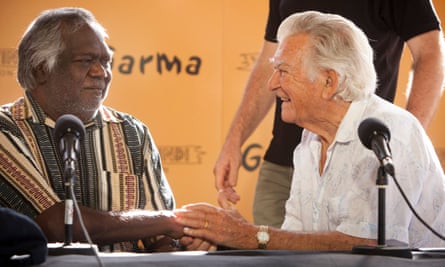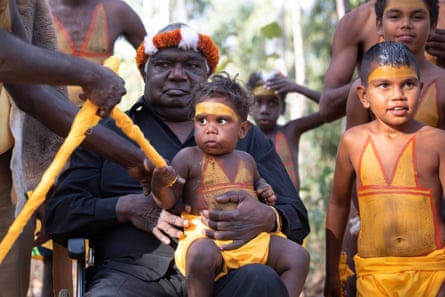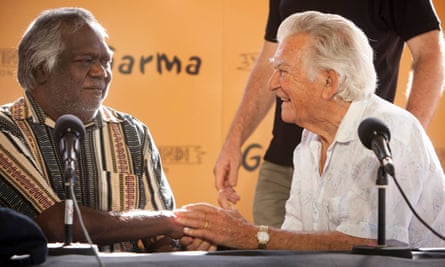[ad_1]
The revered Yolŋu elder Yunupingu has died in his homelands after a lifetime fighting for the rights of his Gumatj clan, his country and all Aboriginal and Torres Strait Islander people. He was 74.
“Yunupingu was a master of the ceremonies and a keeper of the songlines of the Yolngu people,” the Yothu Yindi Foundation said. “He held the deep backbone names of the country and the sacred knowledge of his people.
“He starts his journey now to be reunited with his fathers and his kin, who await him in the hearth of his sacred Gumatj country.
“He returns to where he began, born on sacred Yolngu country in North East Arnhem Land, not knowing Europeans until his early childhood, living with the rhythm of life, the balance of the land, the water, the sacred winds and the ceremonies – he returns now to his ancestors.”
Yunupingu was born at Gunyangara (Marngarr, Ski Beach) in Melville Bay on the Gove peninsula in north-east Arnhem Land, into the Gumatj clan of the Yolŋu people, and into a family of highly accomplished Yolŋu cultural ambassadors and activists.
From the early 1960s Yunupingu began working with his father, the then Gumatj clan leader Mungurrawuy, to campaign for land rights for Yolŋu people.
As a teenager he helped create the first bark petition presented to the Australian parliament in 1963, a call for land rights and a protest against the excision of Yolŋu land for bauxite mining near Nhulunbuy (Gove).
The Yirrkala bark petitions became the first traditional Aboriginal documents recognised by federal parliament.
In 1975 Yunupingu joined the Northern Land Council and in 1977 became its chair . He was a formidable negotiator in talks with mining companies, politicians and governments to protect the rights of Aboriginal people.
He was named Australian of the Year in 1978 and made a member of the Order of Australia for his services to the Aboriginal community in 1985.

In 1988 he presented another bark petition to then prime minister, Bob Hawke, at Barunga festival in the Northern Territory. The Barunga statement was a profound call for self-determination, land rights, compensation for dispossession, the protection of sacred sites, the return of remains, and human rights afforded by international law. It sought a national, elected Aboriginal body, national land rights, recognition of customary law and the negotiation of a treaty.
Hawke made promises but never delivered on national land rights legislation; his final act as prime minister was to hang the Barunga statement on the wall of Old Parliament House, where it remains.
In 2006 Yunupingu, frustrated by decades of broken promises, demanded the Barunga statement be returned. He said it had been fundamentally disrespected by the settler-colonial government and should be buried at Barunga to symbolise the buried hopes of a fair and just settlement.
“Sovereignty became treaty, treaty became reconciliation and reconciliation turned into nothing … We will dig a hole and bury it,” he said at the time. “It will be a protest but I also hope that it can represent a new start for Aboriginal people.”
Yunupingu was a giant of the modern-day struggle for land rights and recognition for Aboriginal people, a committed and powerful leader who met with – and saw off – every prime minister since Billy McMahon in 1972.
He was also a celebrated lawman and singer, his distinctive voice leading the traditional songs heard on many Yothu Yindi recordings.
As chairman of the Yothu Yindi Foundation, Yunupingu oversaw the establishment of the Dhupuma Barker junior school in Gunyangara, and the Garma Institute, realising a long-held dream by community leaders for world-class education facilities in north-east Arnhem Land.

With his Yolŋu kin he gifted the nation the Garma festival, which showcased Yolŋu miny’tji (art), bunggul (dance), manikay (song) and story-telling to a national audience, and which today leads discussion and debate of issues affecting Yolŋu and other Indigenous people.
He was a strong supporter of an Indigenous voice to parliament and had been involved in the referendum working group until ill health restricted his ability to attend meetings or travel.
Nevertheless, his voice remained strong. His final public statement was delivered to parliament by the Labor senator Pat Dodson, who said:
His parents gave him [a] name … which means “the area on the horizon where the sea merges with the sky”.
As he grew older his father and elder sisters would call him [a name meaning] “crystal clear”.
His totem was a sacred rock, an unbreakable rock – Yunupingu – a name that his grandfather gave to his son, who passed it to all his children.
[His] totem is fire, rock and the saltwater crocodile.
The crocodile – baru – is a flame of fire: the mouth, the teeth and the jaw are the fire and its jaw is death.
It is always burning, and through it [he] gains energy, power – strength.
Yunupingu spent his lifetime explaining to the world the Yolŋu worldview.
[He] explains “we seek that moment in the ceremonial cycle where all is equal and in balance. Where older men have guided the younger ones and, in turn, taken knowledge from their elders; where no one is better than anyone else, everyone is equal, performing their role and taking their duties and responsibilities – then the ceremony is balanced and the clan moves in unison: there is no female, no male, no little ones and no big ones; we are all the same.”
This is yothu yindi. Balance. Wholeness. Completeness.
Just as these great clans are bound to each other for all time, so too are all those that now call Australia home.
Together we must secure a future for Australia in which we can find harmony and balance between all the people of this nation.
[He] has described this as “the most serious business” we face as a nation.
[He] worked with no less than 10 prime ministers of Australia on the struggle for recognition, and has lived the many disappointments and broken promises. “I am fire,” he says, “and that fire must burn until there is nothing left.”
Yunupingu, leader, land rights activist and senior lawman, born 30 June 1948; died 3 April 2023
[ad_2]




